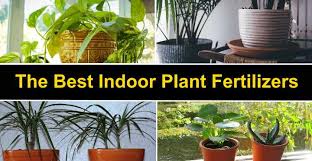Bringing the beauty of nature indoors with houseplants is a trend that continues to gain popularity. However, to ensure your indoor jungle thrives, providing the right nutrients is essential. In this comprehensive guide, we’ll explore the best fertilizer for indoor plants, helping you nourish your green companions and cultivate a vibrant indoor oasis.
Understanding Indoor Plant Fertilization

Unlike outdoor plants that can access nutrients from the soil and natural decomposition processes, indoor plants rely solely on the nutrients provided to them. This makes selecting the right fertilizer crucial for their health and vitality.
When it comes to choosing fertilizers for indoor plants, it’s important to consider their specific needs. Different types of plants have varying requirements for nutrients, so it’s essential to match the fertilizer to the plant’s preferences. Additionally, factors such as potting mix, watering frequency, and light exposure also influence nutrient uptake and fertilizer effectiveness.
Best Fertilizer for Indoor Plants
- All-Purpose Liquid Fertilizer: Liquid fertilizers are popular choices for indoor plants due to their ease of use and quick absorption. All-purpose liquid fertilizers contain a balanced blend of essential nutrients, including nitrogen (N), phosphorus (P), and potassium (K), as well as micronutrients like iron and magnesium. These fertilizers provide a steady supply of nutrients to support overall plant growth and vitality.
- Slow-Release Pellet Fertilizer: Slow-release pellet fertilizers are ideal for busy plant parents who prefer a set-it-and-forget-it approach to fertilization. These pellets release nutrients gradually over time, providing a steady source of nourishment to indoor plants. Slow-release fertilizers are particularly beneficial for plants that prefer a more consistent feeding schedule and can help prevent nutrient imbalances or burns.
- Organic Fertilizers: For those who prefer to take an organic approach to indoor plant care, organic fertilizers offer a natural and sustainable solution. Organic fertilizers are derived from natural sources such as compost, manure, or plant-based materials. They provide a slow but steady release of nutrients and help improve soil structure and fertility over time. Organic fertilizers are especially beneficial for sensitive plants or those grown for edible purposes.

- Water-Soluble Fertilizer: Water-soluble fertilizers are convenient options for indoor plants that are watered regularly. These fertilizers come in powder or liquid form and can be easily dissolved in water before being applied to plants. Water-soluble fertilizers provide a quick nutrient boost and are absorbed by plants through their roots during watering. They are suitable for a wide range of indoor plants and are especially useful for plants grown in containers or hydroponic systems.
- Balanced NPK Fertilizers: Balanced NPK fertilizers contain equal proportions of nitrogen (N), phosphorus (P), and potassium (K), making them suitable for a wide variety of indoor plants. These fertilizers provide a comprehensive blend of nutrients to support healthy foliage, root development, and flowering. Balanced NPK fertilizers are versatile options that can be used throughout the growing season to promote overall plant health and vigor.
- Specialty Fertilizers: Some indoor plants have specific nutritional requirements that may not be met by standard fertilizers. Specialty fertilizers formulated for orchids, succulents, cacti, or other types of indoor plants can provide targeted nutrition to meet their unique needs. These specialty fertilizers often contain additional micronutrients or specific nutrient ratios tailored to the plant’s requirements.
- Homemade Fertilizers: For the DIY enthusiast, homemade fertilizers offer a cost-effective and customizable alternative to commercial products. Common ingredients used in homemade fertilizers include compost, banana peels, eggshells, and coffee grounds. These natural ingredients provide a rich source of nutrients and can be easily incorporated into your indoor plant care routine. However, it’s essential to research and follow proper guidelines for homemade fertilizers to avoid over-fertilization or nutrient imbalances.

Conclusion
Selecting the best fertilizer for indoor plants is essential for promoting healthy growth, vibrant foliage, and abundant blooms. Whether you prefer liquid, slow-release, organic, or specialty fertilizers, there are plenty of options available to suit your plant’s needs and your gardening style. By understanding the nutritional requirements of your indoor plants and choosing the right fertilizer, you can cultivate a thriving indoor garden that brings joy and beauty to your home.



